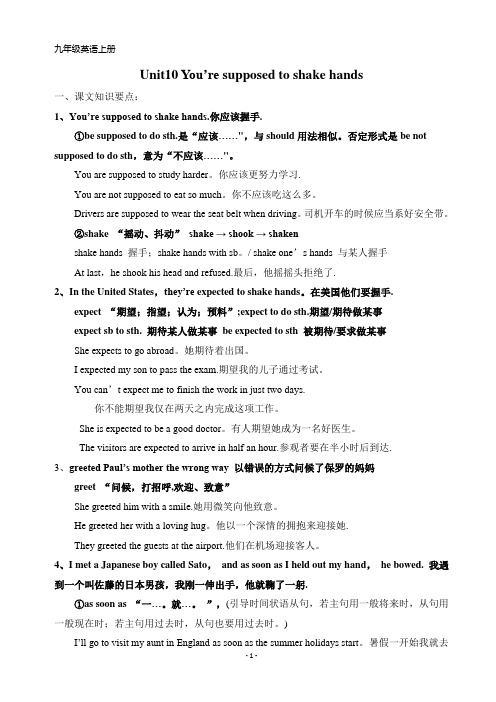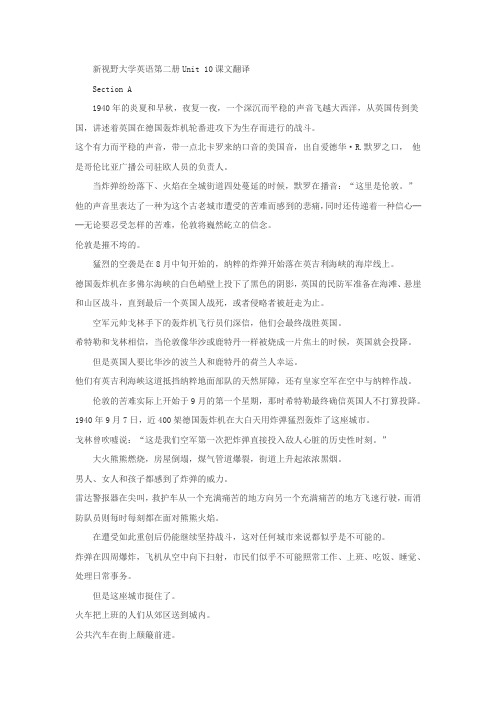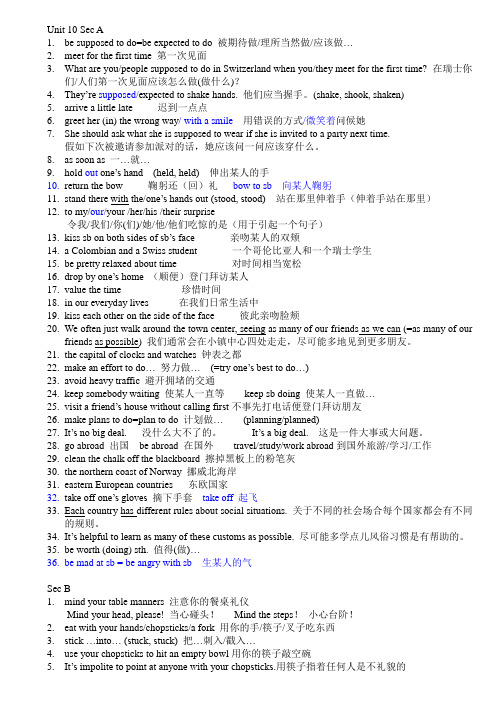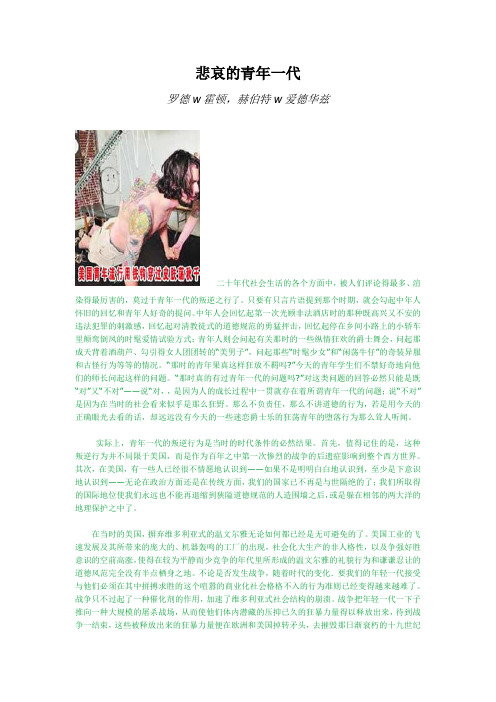unit 10
九年级英语上册unit10知识要点

九年级英语上册Unit10 You’re supposed to shake hands一、课文知识要点:1、You’re supposed to shake hands.你应该握手.①be supposed to do sth.是“应该……",与should用法相似。
否定形式是be not supposed to do sth,意为“不应该……"。
You are supposed to study harder。
你应该更努力学习.You are not supposed to eat so much。
你不应该吃这么多。
Drivers are supposed to wear the seat belt when driving。
司机开车的时候应当系好安全带。
②shake “摇动、抖动”shake → shook → shakenshake hands 握手;shake hands with sb。
/ shake one’s hands 与某人握手At last,he shook his head and refused.最后,他摇摇头拒绝了.2、In the United States,they’re expected to shake hands。
在美国他们要握手.expect “期望;指望;认为;预料”;expect to do sth.期望/期待做某事expect sb to sth. 期待某人做某事be expected to sth 被期待/要求做某事She expects to go abroad。
她期待着出国。
I expected my son to pass the exam.期望我的儿子通过考试。
You can’t expect me to finish the work in just two days.你不能期望我仅在两天之内完成这项工作。
She is expected to be a good doctor。
新视野大学英语第二册Unit 10课文翻译

新视野大学英语第二册Unit 10课文翻译Section A1940年的炎夏和早秋,夜复一夜,一个深沉而平稳的声音飞越大西洋,从英国传到美国,讲述着英国在德国轰炸机轮番进攻下为生存而进行的战斗。
这个有力而平稳的声音,带一点北卡罗来纳口音的美国音,出自爱德华·R.默罗之口,他是哥伦比亚广播公司驻欧人员的负责人。
当炸弹纷纷落下、火焰在全城街道四处蔓延的时候,默罗在播音:“这里是伦敦。
”他的声音里表达了一种为这个古老城市遭受的苦难而感到的悲痛,同时还传递着一种信心──无论要忍受怎样的苦难,伦敦将巍然屹立的信念。
伦敦是摧不垮的。
猛烈的空袭是在8月中旬开始的,纳粹的炸弹开始落在英吉利海峡的海岸线上。
德国轰炸机在多佛尔海峡的白色峭壁上投下了黑色的阴影,英国的民防军准备在海滩、悬崖和山区战斗,直到最后一个英国人战死,或者侵略者被赶走为止。
空军元帅戈林手下的轰炸机飞行员们深信,他们会最终战胜英国。
希特勒和戈林相信,当伦敦像华沙或鹿特丹一样被烧成一片焦土的时候,英国就会投降。
但是英国人要比华沙的波兰人和鹿特丹的荷兰人幸运。
他们有英吉利海峡这道抵挡纳粹地面部队的天然屏障,还有皇家空军在空中与纳粹作战。
伦敦的苦难实际上开始于9月的第一个星期,那时希特勒最终确信英国人不打算投降。
1940年9月7日,近400架德国轰炸机在大白天用炸弹猛烈轰炸了这座城市。
戈林曾吹嘘说:“这是我们空军第一次把炸弹直接投入敌人心脏的历史性时刻。
”大火熊熊燃烧,房屋倒塌,煤气管道爆裂,街道上升起浓浓黑烟。
男人、女人和孩子都感到了炸弹的威力。
雷达警报器在尖叫,救护车从一个充满痛苦的地方向另一个充满痛苦的地方飞速行驶,而消防队员则每时每刻都在面对熊熊火焰。
在遭受如此重创后仍能继续坚持战斗,这对任何城市来说都似乎是不可能的。
炸弹在四周爆炸,飞机从空中向下扫射,市民们似乎不可能照常工作、上班、吃饭、睡觉、处理日常事务。
但是这座城市挺住了。
火车把上班的人们从郊区送到城内。
初三英语Unit 10 重点词句(特全)

Unit 10 Sec A1.be supposed to do=be expected to do 被期待做/理所当然做/应该做…2.meet for the first time 第一次见面3.What are you/people supposed to do in Switzerland when you/they meet for the first time? 在瑞士你们/人们第一次见面应该怎么做(做什么)?4.They’re supposed/expected to shake hands. 他们应当握手。
(shake, shook, shaken)5.arrive a little late 迟到一点点6.greet her (in) the wrong way/ with a smile用错误的方式/微笑着问候她7.She should ask what she is supposed to wear if she is invited to a party next time.假如下次被邀请参加派对的话,她应该问一问应该穿什么。
8.as soon as 一…就…9.hold out one’s hand (held, held) 伸出某人的手10.return the bow 鞠躬还(回)礼bow to sb 向某人鞠躬11.stand there with the/one’s hands out (stood, stood) 站在那里伸着手(伸着手站在那里)12.to my/our/your /her/his /their surprise令我/我们/你(们)/她/他/他们吃惊的是(用于引起一个句子)13.kiss sb on both sides of sb’s face 亲吻某人的双颊14.a Colombian and a Swiss student 一个哥伦比亚人和一个瑞士学生15.be pretty relaxed about time 对时间相当宽松16.drop by one’s home (顺便)登门拜访某人17.value the time 珍惜时间18.in our everyday lives 在我们日常生活中19.kiss each other on the side of the face 彼此亲吻脸颊20.We often just walk around the town center, seeing as many of our friends as we can (=as many of ourfriends as possible) 我们通常会在小镇中心四处走走,尽可能多地见到更多朋友。
unit 10课文译文

悲哀的青年一代罗德w霍顿,赫伯特w爱德华兹二十年代社会生活的各个方面中,被人们评论得最多、渲染得最厉害的,莫过于青年一代的叛逆之行了。
只要有只言片语提到那个时期,就会勾起中年人怀旧的回忆和青年人好奇的提问。
中年人会回忆起第一次光顾非法酒店时的那种既高兴又不安的违法犯罪的刺激感,回忆起对清教徒式的道德规范的勇猛抨击,回忆起停在乡间小路上的小轿车里颠鸾倒凤的时髦爱情试验方式;青年人则会问起有关那时的一些纵情狂欢的爵士舞会,问起那成天背着酒葫芦、勾引得女人团团转的“美男子”,问起那些“时髦少女”和“闲荡牛仔”的奇装异服和古怪行为等等的情况。
“那时的青年果真这样狂放不羁吗?”今天的青年学生们不禁好奇地向他们的师长问起这样的问题。
“那时真的有过青年一代的问题吗?”对这类问题的回答必然只能是既“对”又“不对”——说“对,,是因为人的成长过程中一贯就存在着所谓青年一代的问题;说“不对”是因为在当时的社会看来似乎是那么狂野。
那么不负责任,那么不讲道德的行为,若是用今天的正确眼光去看的话,却远远没有今天的一些迷恋爵士乐的狂荡青年的堕落行为那么耸人听闻。
实际上,青年一代的叛逆行为是当时的时代条件的必然结果。
首先,值得记住的是,这种叛逆行为并不局限于美国,而是作为百年之中第一次惨烈的战争的后遗症影响到整个西方世界。
其次,在美国,有一些人已经很不情愿地认识到——如果不是明明白白地认识到,至少是下意识地认识到——无论在政治方面还是在传统方面,我们的国家已不再是与世隔绝的了;我们所取得的国际地位使我们永远也不能再退缩到狭隘道德规范的人造围墙之后,或是躲在相邻的两大洋的地理保护之中了。
在当时的美国,摒弃维多利亚式的温文尔雅无论如何都已经是无可避免的了。
美国工业的飞速发展及其所带来的庞大的、机器轰鸣的工厂的出现,社会化大生产的非人格性,以及争强好胜意识的空前高涨,使得在较为平静而少竞争的年代里所形成的温文尔雅的礼貌行为和谦谦忍让的道德风范完全没有半点栖身之地。
Unit 10 知识点精讲精练

Unit10 If you go to the party you’ll have a great time!知识点讲解一、If you do, the teachers won’t let you in.do, does, did等助动词可用来代替上文提到的动词,以避免重复例句:I don’t want to go shopping, but she does. 我不想去购物,但是她想去。
二、If you ask people to bring food, they’ll just bring potato clips and chocolate because they’ll be too lazy to cook. 如果你让大家带食物来,他们只会带炸薯条和巧克力,因为他们太懒了。
1、ask sb. to do sth.意为"要求某人做某事",其否定形式是"ask sb. not to do sth."要求某人不要做某事。
例句:I ask him to go to the movies. 我让他去电影院。
(2)too + adj./adv. + to do sth. 意为"太……而不能做某事",表否定意义。
【注意】too … to … 有时可与not ... enough to...进行同义转换。
例句:The math problem is too difficult for me to work out. 这道数学题太难,我解不出来。
例句:The boy is too young to join the army. = The boy is not old enough to join the army.这个男孩太小了还不能参军。
三、If you go to the party, you’ll have a great time. 如果你参加聚会,你将会玩得很开心。
1、本句是含有条件状语从句的复合句。
九年级单词unit 10

九年级单词Unit101.custom n. 风俗;习俗2.bow v. 鞠躬3.kiss v. & n. 亲吻;接吻4.greet v. 和⋯⋯打招呼;迎接5.relaxed adj. 放松的;自在的6.value v. 重视;珍视n. 价值7.everyday adj. 每天的;日常的8.drop by 顺便访问;随便进入9.capital n. 首都;国都10.noon n. 正午;中午11.mad adj. 很生气;疯的12.get mad 大动肝火;气愤13.effort n. 努力;尽力14.make an effort 作出努力15.traffic n. 交通;路上行驶的车辆16.somewhere adv. 在某处;到某处17.passport n. 护照18.chalk n. 粉笔19.blackboard n. 黑板20.northern n/ adj. 北方的;北部的21.coast n. 海岸;海滨22.season n. 季;季节23.knock v. 敲;击24.eastern adj. 东方的;东部的25.worth adj. 值得;有⋯⋯价值(的)26.manner n. 方式;方法(pl.) 礼貌;礼仪27.empty adj. 空的;空洞的28.basic adj. 基本的;基础的29.exchange n. & v. 交换30.go out of one’s way特地;格外努力31.make ... feel at home 使(某人)感到宾至如归32.teenage adj. 十几岁的;青少年的33.granddaughter n. (外)孙女34.behave v. 表现;举止35.except prep. 除⋯⋯之外conj. 除了;只是36.elbow n. 肘;胳膊37.gradually adv. 逐步地;渐进地38.suggestion n. 建议39.Brazil 巴西40.Mexico 墨西哥41.Cali 卡利(哥伦比亚城市)42.Colombia VmbI 哥伦比亚(南美洲国家)usanne 洛桑(瑞士城市)44.Norway weI挪威。
新人教版 九年级unit 10 重点短语、句型
Unit 10 背记篇重点短语1、for the first time首次;初次2、shake hands (with sb)(与某人)握手3、as soon as一……就……4、hold out伸出(手等)5、a little/bit late有点儿晚6、drop by顺便访问7、as…as one can/could尽可能……8、on time准时,按时9、the capital of………的首都/国都10、at noon在中午11、get mad大动肝火;气愤12、clean off把……擦掉13、take off脱下(衣服);(飞机等)起飞14、table manners餐桌礼仪15、stick…into…把……插入16、point at指着17、make… feel at home使(某人)感到宾至如归18、show up出席;露面19、after all毕竟;终究20、go abroad出国21、at the table在餐桌旁22、be supposed to do sth应该做某事 23、be expected to do sth被期望做某事 24、to one’s surprise使/让某人吃惊的是 25、make plans to do sth 制定计划做某事 26、invite sb to do sth邀请某人做某事 27、make an effort to do sth努力做某事28、keep sb doing sth使/让某人一直做某事29、without doing sth没有做某事30、go out of one’s way to do sth特地做某事;格外努力地做某事31、used to do sth过去常常做某事32、get/be used to doing sth习惯于做某事33、look forward to doing sth盼望/期待做某事34、it’s+adj.+to do sth做某事是……的35、no reason to do sth没有理由做某事1、what are you supposed to do when you meet someone for the first time?当你初次与某人见面时你应该做什么?------You’re supposed to shake hands. You’re not supposed to kiss.--------你应该握手。
人教版九年级英语全册教师用书:Unit 10
Unit 10You're supposed to shake hands.1.be expected to do被预期会做……expect的被动形式后面加不定式,意为“被预期会做……”。
如:①He is expected to arrive at five in the afternoon.预期他将会在下午五点到达。
②My teacher is expected to come to the party today.预计我的老师会参加今天的聚会。
③He studies hard these days, and he's expected to do well in the exam.他最近学习很用功,预计他能在考试中取得好成绩。
2.It's very important to be on time.准时很重要。
(1)important是形容词,常用句式是It's important (for sb.) to do sth.。
如:It's important for us to learn English well.对我们来说学好英语是重要的。
(2)如果只是说“对某人是重要的”,可以用be important to sb.。
如:Knowing Western customs is important to us.了解西方习俗对我们很重要。
3.I greeted Paul's mother the wrong way.我用错误的方式问候保罗的母亲。
greet意为“问候;向……打招呼”。
如:①He greeted her by saying “Good morning”.他向她打招呼,说“早上好”。
②She greeted me with a friendly smile.她向我微笑致意。
③A beautiful view greeted us.美丽的景色呈现在我们的面前。
人教版九年级英语Unit10单元知识点课件
解析 本题考查be worth doing的结构。
答案 visiting
Unit 10
You're supposed to shake hands.
栏目索引
Section B
知识点八 empty的用法 教材原文 In China,it‘s impolite to use your chopsticks to hit an empty bowl. 在中国,用筷子敲打空碗是不礼貌的。 empty是形容词,意为“空的;空洞的”,此时其反义词是full“满的;充满的”。 I found an empty wallet on the ground. 我在地上发现了一个空钱包。 归纳拓展 empty还可以作动词,意为“倒空”,此时其反义词是fill“装满;充满”。 Please empty the dustbin first. 请先把垃圾箱倒空。
The plane will take off in half an hour. 飞机将于半个小时后起飞。
Unit 10
You're supposed to shake hands.
栏目索引
例 (2017湖北武汉中考)My elder brother
my wet sports shoes
and made me sit by the fire.
人教版九年级英语 Unit10 单元知识点课件
Unit 10
You're supposed to shake hands.
栏目索引
Unit 10
You're supposed to shake hands.
栏目索引
Section A
知识点一 as soon as引导的时间状语从句 教材原文 I met a Japanese boy called Sato, and as soon as I held out my hand, he bowed.我遇到了一个名叫佐藤的日本男孩,我一伸出手,他就鞠躬。 as soon as表示“一……就……”,引导时间状语从句。 The movie began as soon as we got there. 我们一到那儿电影就开始了。 易错提醒 as soon as引导时间状语从句时,如果主句是一般将来时,从句常用一般 现在时表示将来。 I'll tell him as soon as I see him. 我一见到他就告诉他。
Unit 10 Love and Resentment
• span [ /spæ n/ ]
• • • • • • • • • • • • • • • n. 1五指张开时的)指距 2 一拃宽(通常为9英寸或23厘米) 3 一拃的宽度(或部分) 4 (桥梁的)跨度,跨距;孔;桥墩距,支点距 5 全长;全幅 6 一段时间;短暂的时间 7 持续时间,时间阶段 8 短距离;小范围 9 【航空学】(飞机的)翼展 10 【统计学】数值范围;极差 11 【数学】生成空间 vt. 1 用拃丈量,用手度量 例句 to span the table to see how long it is 用拃丈量桌子,看有多长
burgeon ['bə:dʒən]
• 1. 迅速成长,迅速发展,扩展,增长,发展繁荣,兴旺: • She burgeoned into a fine actress. 她迅速成长为一名优秀的女演员。 • the burgeoning suburbs 如雨后春笋般兴起的市郊区 • 2. 发芽,萌芽,抽芽,抽枝,抽条,长出蓓蕾(通常与out 或forth连用): Willows have burgeoned forth. 柳树已经发芽。 • vt.发(芽),生出蓓蕾;抽(枝) • n.新芽,嫩芽;蓓蕾;嫩枝[亦作bourgeon]
• • • • • • n. 1. (情感、激情等的)爆发,突发 2. (火山等的)喷发;(太阳黑子等的)大爆发 3. (活动、能量等的)迸发,激增 4. 暴乱,暴动 An occasional outburst of anger creates wrinkles on the face. • 一次愤怒的偶然爆发会在脸部产生皱纹。
• • • • • • • muffled ['mʌfld] a. (指声音)听不清的(因有物体相隔) muffle ['mʌfl] n. 低沉的声音,消音器,上唇 v. 围裹,抑制,发低沉的声音 muffle up 裹住;蒙住:;捂住(声音):
- 1、下载文档前请自行甄别文档内容的完整性,平台不提供额外的编辑、内容补充、找答案等附加服务。
- 2、"仅部分预览"的文档,不可在线预览部分如存在完整性等问题,可反馈申请退款(可完整预览的文档不适用该条件!)。
- 3、如文档侵犯您的权益,请联系客服反馈,我们会尽快为您处理(人工客服工作时间:9:00-18:30)。
Unit 10 Strong Forms and Weak FormsListening Exercise 1Listen to the following words. First you will hear the function word in its strong form and weak form. Then you will hear a sentence with the weak form of the word.Words Strong form Weak form Sample sentence1. a /e✋/ /☜/ We've got a dog.2. an /✌n/ /☜n/ Take an apple.3. her /h☜:/ /h☜/, /☜:/, /☜/ What's her name?4. his /h✋z/ /✋z/ John had his haircut.5. our /a☺☜/ / :/ We can do it on our own.6. some /s✈m/ /s☜m/, /sm/ Get me some water.7. the /❆i:/ /❆✋/, /❆☜/ They saw the young and the old.8. your /j :/ /j☜/ Take your time.9. he /hi:/ /h✋/, /✋/ What did he do?10. me /mi:/ /m✋/ Let me have a look.11. she /☞i:/ /☞✋/ Did she come?12. them /❆em/ /❆☜m/, /❆m/ Let them go.13. us /✈s/ /☜s/ He told us a story.14. we /wi:/ /w✋/ Here we are.15. you /ju:/ /j☺/ Did you see my pen?16. him /h✋m/ /✋m/ Give him a pen.17. am /✌m/ /☜m/, /m/ I'm proud of it.18. are / :/ /☜/ What are you doing?19. be /bi:/ /b✋/ Don't be late.20. can /k✌n/ /k☜n/, /kn/ What can I do?21. do /du:/ /d☜/, /d/ What do you do on Sundays?22. does /d✈z/ /d☜z/ When does the train leave?23. had /h✌d/ /h☜d/, /☜d/, /d/ How many had he had?24. has /h✌z/ /h☜z/, /☜z/, /z/, /s/ What has happened?25. have /h✌v/ /h☜v/, /☜v/, /v/ The kids have gone.26. is /✋z/ /z/, /s/ He is coming.27. must /m✈st/ /m☜st/, /m☜s/ We must go now.28. shall /☞✌l/ /☞☜l/, /☞l/ What shall we do?29. was /w z/ /w☜z/, /wz/ He was out.30. were /w :/ /w☜/ We were all late.31. will /w✋l/ /w☜l/, /☜l/ That will do.32 at /✌t/ /☜t/ Look at him.33. for /f :/ /f☜/ Is it for me?34. from /fr m/ /fr☜m/, /frm/ They come from the states.35. of / v/ /☜v/, /v/, /f/ It's very kind of you.36. to /tu:/ /t☜/ You don't have to worry.37. and /✌nd/ /☜nd/, /☜n/, /nd/, /n/ We had fish and chips.38. as /✌z/ /☜z/ Just as you like.39. but /b✈t/ /b☜t/ It's good but expensive.40. so /s☜☺/ /s☜/ It's not so cold here.41. than /❆✌n/ /❆☜n/ It's bigger than this.42. that /❆✌t/ /❆☜t/ He said that he was coming. Listening Exercise 2Listen to each of the following sentences twice. First mark the pronunciation of the function words in the sentence. Then write down the meaning of the underlined part of the sentence.Example: We saw Jack and Jill. and /n/ both Jack and JillWe saw Jack and Jill. and /✌nd/ not only Jack but also Jill1. Get me some bread and butter. ________ _____________________Get me some bread and butter. ________ _____________________2. She gave it to us. ________ _____________________She gave it to us. ________ _____________________3. Lucy and Lilly are sisters. ________ _____________________Lucy and Lilly are sisters. ________ _____________________4. Take an apple. ________ _____________________Take an apple. ________ _____________________5. I've got a cat. ________ _____________________I've got a cat. ________ _____________________6. The performance was good. ________ _____________________The performance was good. ________ _____________________7. John can do it. ________ _____________________John can do it. ________ _____________________8. I had a knife. ________ _____________________I had a knife. ________ _____________________9. I'm afraid we must go. ________ _____________________I'm afraid we must go. ________ _____________________10. Come with me, Jill. ________ _____________________Come with me, Jill. ________ _____________________ Listening Exercise 3Listen to the following sentences. Draw a line through the unstressed function words.Example: I was thinking of you all the time.1.It is not an easy decision to make.2.No one can pass the test.3.What is her name?4.They have been here the whole afternoon.5.Can I have some more?6.He was good, wasn't he?7.We will wait till the end of the party.8.She opened her eyes and saw the girl at the door.9.She told me that she had lost her voice.10.That's a pity but we can go another time.11.They told us to leave.12.First of all, let's look at the map.13.It is from overseas.14.Jack and Jill are at the concert.15.These are for a different purpose.16.The others were at the front.17.Everything was for the best.18.Let's have fish for a change.19.I am going away for the day.20.I would rather have a drink than a smoke.Speaking Exercise 1Listen to and repeat the following phrases and sentences. Pay special attention to the pronunciation of the unstressed forms of the function words.A. Determiners: "a", "an", "the", "her", "his", "our", "some","your"1. a break Take a break.2. a ring Buy a ring.3. an answer Give an answer.4. an idea Have an idea.5. the car Take the car.6. the girl Help the girl.7. the others Meet the others.8. the apple Get the apple.9. her coat Take her coat.10. her bag Watch her bag.11. his watch Use his watch.12. his wife See his wife.13. our school Near our school.14. our classroom Clean our classroom.15. some tea Have some tea.16. some water Get some water.17. your boss Tell your boss.18. your book Buy your book.19. your time Take your time.20. some sugar Find some sugar.B. Pronouns: "he", "me", "she", "them", "us", "we", "you", "him"1.Did he say that?2.Make sure that he is on time.3.Tell me how to do it.4.Give me a new book.5.What is she doing?6.When did she come?7.Ask them to go.8.I told them to finish it as soon as possible.9.He gave us a talk the other day.10.He showed us round the campus.11.When are we going?12.Are you sure we can go now?13.Did you see the old man?14.I heard you singing.15.Give him what he wants.16.I saw him reading in the classroom.17.How did he come last night?18.I am not sure if he is coming.19.Does she know about it?20.You know him, don't you?C. Connectives: "and", "as", "but", "so", "than", "that"1.He said that over and over again.2.She keeps cats and dogs.3.They were playing hide and seek.4.He took off his hat and coat.5.It looks as white as snow.6.Just as you like.7.Please do as I do.8.She is tired but happy.st but not least.10.I'll do anything but that.11.It's not so cold today.12.It is not so much as that.13.It is easier than I thought it would be.14.It is bigger than this.15.He is much better than the others.16.He said that we could have it.17.Tell them that we are not going.18.I think that we'll have enough.19.He told me that everybody was happy.20.Are you sure that we can finish it by the end of the week?D. Auxiliary verbs (1): "am", "are", "be", "do", "does", "is", "was", "were",1.Where an I going?2.What are you doing?3.They'll be able to do it.4.How do you go to school?5.When does he leave for school in the morning?6.It is coming back soon.7.That was all.8.They were all there.9.The cakes are awful.10.They were afraid of him.11.When are they leaving?12.They're afraid of him.13.Will they be able to do it?14.Do you know all the words?15.What does he do on Sunday?16.What time does it start?17.Where were the boys last night?18.He was late last night.19.It was snowing the whole morning.20.They were all out.E. Auxiliary verbs (2): "can", "had", "has", "have", "must", "shall", "will", "would"1.All the kids can read now.2.How many cards had he written before you called last night?3.What has he done?4.They have all gone.5.We must work harder.6.We shall need to hurry.7.That will do, I hope.8.That would be a great help.9.The bus had already left.10.What shall we do if it rains?11.Can you come at eight?12.How can I help you?13.You'd better run.14.The train had already left when we arrived.15.He's read all the books.16.She must have been here for quite a while.17.They've been here for an hour.18.Shall we go now?19.Will you do me a favour?20.Would you like to come?F. Prepositions: "at", "for", "from", "of", "to"1.They are at school.2.They arrived at eleven.3.They finished it at last.4.I'll talk about it at noon.5.He got it for nothing.6.He stayed there for a week.7.They are all waiting for the bus.8.He did it for my sake.9.I had a call from Bill the other day.10.Did you get it from a shop?11.He is from the states.12.Try to speak from the experience.13.It is very kind of you.14.I am tired of waiting.15.He keeps a lot of dogs.16.Give it to me if you like.17.She walks to school.18.He wants to talk.19.They'd like to go.20.I meant to ask you.Speaking Exercise 2Listen to and repeat the following phrases, paying special attention to the pronunciation of "and". The function word "and" is one of the most common words in English and is usually contracted to a schwa + "n".1.cream and sugar2.knives and forks3.big and small4.rock and roll5.fish and chips6.pens and pencils7.sandwich and coffee8.peanut butter and jelly9.hamburger and fires10.rich and famous11.nickels and dimes12.men and women13.tables and chairs14.boys and girls15.radio and television16.sons and daughters17.doctors and patients18.father and mother19.teachers and students20.war and peaceListening Exercise 4Listen to the following talk and write the unstressed words in the space.Now, ______________ end ___________ morning ____________ all ______ able _______ collect ______ timetable _____________ college office. _________ see ________ first lecture _____________ nine o'clock ___________ morning _________ last ___________ four o'clock __________ afternoon. Most __________, ________ fact all ___________, __________ find ____________ spare time without lectures or laboratory sessions. _________ college library ________ private study rooms _________ open all day __________ nine ___________ morning till eight ________ evening _______ private study. _______ students' union common room ________ also open ____________ same times. And … er … ______ hand over ______ Mrs White, who ________ tell ________ about students' welfare, sports clubs _________ examinations.Speaking Exercise 3Listen to the following phrases from the talk and repeat after the tape. Mark the stress patterns of the word groups. Draw a line through the weak form words. Pay special attention to the pronunciation of the weak form words in the sentences.Example: in fact all of you . - - . .1.at the end of the morning _________________2.you will all be able to …_________________3.from the college office _________________4.at nine o'clock in the morning _________________5.at four o'clock in the afternoon _________________6.most of you _________________7.from nine in the morning _________________8.till eight in the evening _________________9.open at the same times _________________10.sports clubs and examinations. _________________Listening Exercise 5Listen to the following conversation. Underline the stressed words. Mark the schwa / / on the unstressed words when you hear it.Example: You've just moved into a new house, haven't you?—So what's it like living in your own house?—It's heaven. Plenty of space, a garden, no worries about neighbours. Houses are great for families.—I prefer apartments in my situation. They're easier to manage, cheaper to run and more secure. You can't leave a house standing empty for too long.—That's true, but an apartment is always an apartment, and a house is a home. Speaking Exercise 4Listen to the following sentences from the conversation and repeat after the tape. Draw a line through the weak form words. Pay special attention to the pronunciation of the weak form words in the sentences.1.What's it like living in your own house?2.It's heaven.3.Plenty of space, a garden, no worries about neighbours.4.Houses are great for families.5.I prefer apartments in my situation.6.They're easier to manage.7.They're cheaper to run and more secure.8.You can't leave a house standing empty for too long.9.That's true.10.An apartment is always an apartment, and a house is a home.Speaking Exercise 5Read the following conversation. Draw a line through the weak form words. Pay special attention to the pronunciation of the weak form words.—So what's it like living in your own house?—It's heaven. Plenty of space, a garden, no worries about neighbours. Houses are great for families.—I prefer apartments in my situation. They're easier to manage, cheaper to run and more secure. You can't leave a house standing empty for too long.—That's true, but an apartment is always an apartment, and a house is a home. Listening Exercise 5Listen to the following dialogue and answer the questions that follow. Listen again and imitate the pronunciation and intonation in the sentences.(G = George L = Li Ping)G: My Chinese course ends in a few months.L: You’ll have to get a real job. Maybe you should start looking now. What does your advisor suggest?G: He says I ought to write to joint-venture companies. I should send them my resume and samples of my work.L: You’d better get going. The competition out there is awful.G: I know. I’ll contact them right away.Listening Exercise 6Listen to the following dialogue and answer the questions that follow. Listen again and imitate the pronunciation and intonation in the sentences.(D = David L = Li Ping)L: Well, David, Where are you going for your holiday?D: Oh well, I’m not really sure. I thought perhaps you could give me some advice? L: I’d be glad to.D: Well, I like to see a few different cities and I’d love to take a boat journey.L: Have you ever thought of travelling through the Yangzi Gorges. That’s the most well-known boat trip I think, and it is spectacular.D: Re ally? The Yangzi Goreges? Yes, well, I’ve heard of them of course. But how could I get there?L: Well, you should go to Chongqing and go downstream by boat to Wuhan.There’s a direct flight to Chongqing from Guangzhou.D: I’m not so keen on flying, actu ally. Is there a train?L: I’m not sure. I’d have to check. But the distance must be pretty big and the journey will take a long time. I’ve got a good guidebook. I think I’ll see what I can find out in that, first. But I can also check it out with the Travel Service. D: Good idea. Hope you can get it fixed for me.L: Sure, I will. I’ll see you later.D: Thanks. See you later.。
